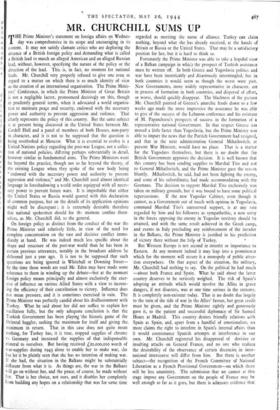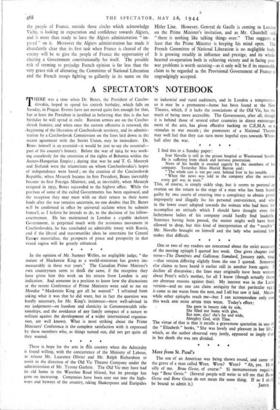MR. CHURCHILL SUMS UP
a
d
THE Prime Minister's statement on foreign affairs on Wednes- day was comprehensive in its scope and encouraging in its content. It may not satisfy clamant critics who are deploring the absence of a British foreign policy and demanding what is called a British lead to match an alleged American and an alleged Russian lead, without, however, specifying the nature of the policy or the direction of the lead. This is, in fact, no moment for national leads. Mr. Churchill very properly refused to give one even m regard to a matter on which there is so much identity of view as the creation of an international organisation. The Prime Minis- ters' Conference, in which the Prime Minister of Great Britain is not a negligible factor, pronounced decisively on this, though in prudently general terms, when it advocated a world organisa- tion to maintain peaie and security, endowed with the necessary power and authority to .prevent aggression and violence. That clearly represents the policy of this country. But the same subject is at present being discussed in the United States between Mr. Cordell Hull and a panel of members of both Houses, non-party in character, and it is not to be supposed that the question is being overlooked at Moscow. What it is essential to evolve is a United Nations policy regarding the post-war League, not a collec- tion of national policies, differing perhaps substantially in detail, however similar in fundamental aims. The Prime Ministers went far beyond the practice, though not so far beyond the theory, of the existing League when they spoke of the new body being " endowed with the necessary power and authority to prevent aggression and violence," and Mr. Churchill used almost identical language in foreshadowing a world order equipped with all neces- sary power to prevent future wars. It is improbable that either the United States or Russia would quarrel with this declaration of common purpose, but on the details of its application opinions might well be discrepant ; it is extremely desirable therefore that national spokesmen should for the: moment confine them- selves, as Mr. Churchill did, to the general.
On foreign policy as distinct from the conduct of the war the Prime Minister said relatively little, in view of the need for complete concentration on the vast and decisive conflict imme- diately at hand. He was indeed much less specific about the shape and structure of the post-war world than he has been in certain previous utterances, notably in the broadcast address he delivered just a year ago. It is not to be supposed that such questions are being ignored in Whitehall or Downing Street— by the time these words are read Mr. Eden may have made some reference to them in winding up the debate—but at the moment foreign policy means principally and almost exclusively the exer- cise of influence on various Allied States with a view to increas- ing the efficiency of their contribution to victory. Influence does not mean pressure, and it is sometimes exercised in vain. The Prime Minister was perfectly candid about his disillusionment with Turkey. What he said about her did not suffice to explain her vacillation fully, but the only adequate conclusion is that the Turkish Government has been playing-the historic game of the Oriental haggler, seeking the maximum for itself and giving the. minimum in return. That in this case does not quite mean nothing, for Turkey has, it is true, stopped supplies of chrome to Germany and increased the supplies of that indispensable mineral to ourselves. But having received £20,000000 worth of war-supplies during 1943 alone to enable her to make war, she has let it be plainly seen that she has no intention of malting war. If she had, the situation in the Balkans might be substantially different from what it is. As things are, the war in the Balkans will go on without her, and the peace, of course, be made without her. That is her choice, not ours, and it disables her completely from building any hopes on a relationship that was for some time
d
y
e
regarded as meriting the name of alliance. Turkey can claim nothing, beyond what she has already received, at the hands of Britain or Russia or the United States. That may be a satisfactory position for her, but it is hard to think so.
Fortunately the Prime Minister was able to take a hopeful view of a Balkan campaign in which the prospect of Turkish assistanze must be written off. In both Greece and Yugoslavia politics and war have been inextricably and disastrously intermingled, but in both countries it would seem as though the worst were past. New Governments, more widely representative in character, arc in process of formation in both countries, and dispersal of effort, or worse, should quickly disappear. The blackness of the picture Mr. Churchill painted of Greece's anarchic feuds down to a few weeks ago made the more impressive the assurance he was able to give of the success of the Lebanon conference and his estimate of M. Papandreou's prospects of success in the formation of a representative national Government. In that respect Greece has moved a little faster than Yugoslavia, but the Prime Minister was able to impart the news that the Puritch Government had resigned, and that in the next administration General Mihailovitch, at present War Minister, would have no place. That is a matter for the Yugoslays themselves, but there is no doubt that the British Government approves the decision. It is well known that this country has been sending supplies to Marshal Tito and not to General Mihailovitch, and the Prime Minister gave the reason bluntly. Mihailovitch, he said, had not been fighting the enemy, and some of his subordinates had made accommodation with the Germans. The decision to support Marshal Tito exclusively was taken on military grounds, but it was bound to have some political repercussions. If the new Yugoslav Cabinet, even though it cannot, as a Government out of touch with opinion in Yugoslavia, command Marshal Tito's unreserved support, is at any rate regarded by him and his followers as sympathethic, a new unity in the forces opposing the enemy in Yugoslav territory should be attained, and with the same result achieved in the Greek camp, and events in Italy precluding any reinforcement of the invader in the Balkans, the Prime Minister is justified in his prediction of victory there without the help of Turkey. • • But Western Europe is not second in interest or importance to Eastern. At any moment indeed it may leap into a prominence which for the moment will secure it a monopoly of public atten- tion everywhere. On that aspect of the situation, the military, Mr. Churchill had nothing to say. On the political he had much —about both France and Spain. What he said about the latter country deserves to be seriously weighed. The risk of Spain's adopting an attitude which would involve the Allies in grave dangers, if not disasters, was at one time serious in the extreme.
It is completely non-existent today. That is no doubt due largely to the turn of the tide of war in the Allies' favour, but great credit must be given, and the Prime Minister rightly and generously gave it, to the patient and successful diplomacy of Sir Samuel Hoare at Madrid. This country desires friendly relations with Spain as Spain, and, apart from a handful of emotionalists, no more claims the right to interfere in Spain's internal affairs than it would countenance Spanish attempts at interference in our own. Mr. Churchill registered his disapproval of derisive or insulting attacks on General Franco, and no one who realises the desirability of the observance of certain decencies in inter- national intercourse will differ from him. But there is another subject—the recognition of the French Committee of National Liberation as a French Provisional Government--on which there will be less unanimity. The submission that we cannot at this stage impose any Government on the people of France may be well enough so far as it goes, but there is adequate evidence that the people of France, outside those circles which acknowledge Vichy, is looking in expectation and confidence towards Algiers, and is more than ready to have the Algiers administration " im- osed " on it. Moreover the Algiers administration has made it abundantly clear that its first task when France is cleared of the enemy will be to give the people of France the opportunity of electing a Government constitutionally for itself. The possible risk of seeming to prejudge French opinion is far less than the very grave risk of alienating the Committee of National Liberation and the French troops fighting so gallantly in its name on the Hitler Line. However, General de Gaulle is coming to London on the Prime Minister's invitation, and as Mr. Churchill said " there is nothing like talking things over." That suggests at least that the Prime Minister is keeping his mind open. The French Committee of National Liberation is no negligible body. It is growing steadily in influence and -prestige, and its whole- hearted co-operation both in achieving victory and in facing post- war problems is worth securing—as it only will be if its reasonable claim to be regarded as the Provisional Government of France is ungrudgingly accepted.



























 Previous page
Previous page